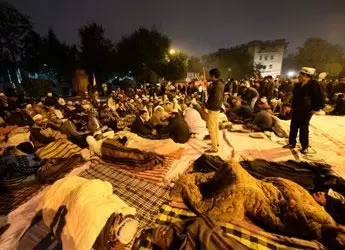AAP's scorn for the law sees its halo dimmed
27-January-2014

The anti-corruption crusaders of the Aam Admi Party (AAP) are emerging from their latest controversies with their halos slightly askew.
Among those who are hogging the headlines because of their intemperate words and deeds are the chief minister, Arvind Kejriwal, and the law minister, Somnath Bharti, with a "poet", Kumar Vishwas, following in the wake.
 |
|
Delhi Chief Minister Arvind Kejriwal with his supporters during their dharna outside the Rail Bhavan (Photo: Indian Photo Agency)
|
Although the chief minister's dharna, or a sit-in protest, in the heart of the national capital is now over, it didn't prevent Union home minister Sushil Kumar Shinde from describing him as an yeda, an expressive Marathi term whose meaning is said to range from insane to eccentric to, at a stretch, genius.
While the last word may not be applicable in its customary sense to the actors in the ongoing drama, what is undeniable is how quickly the AAP has managed to dissipate much of the expectations it generated among large sections of the people.
Arguably, it can take a genius to achieve this kind of a reversal of fortune. And the man who can be said to have played a major part in shooting the party in the foot is Bharti, who has now been gagged by his outfit although it has chosen to overlook his other acts of misdemeanour, including a propensity to take the law into his own hands.
His muzzling, however, followed some of the most shocking invectives which he hurled at his opponent, namely, the Bharatiya Janata Party's Arun Jaitley, and the well-known lawyer, Harish Salve. Bharti's threat to spit on them and get them beaten up was the result of their criticism of the raid which he conducted against suspected sex and drug racketeers in Delhi's Khirki area. His activism might not have created a ruckus if he had adhered to the law instead of acting like a bull in a china shop.
But it is apparently a feature of AAP's politics that it has no time for legal niceties. Since the party members seemingly regard themselves as holy warriors battling a corrupt system, Bharti wanted the raid to be conducted without warrant against what he called "bahar ke badmash" or crooks from outside, who were Ugandan, Nigerian and other African nationals.
The law minister targeted them in accordance with the kind of racial stereotype which prevails among some locals that the blacks are up to no good. The AAP's pretentious ideological guru, Yogendra Yadav, has since admitted that the party is worried about the prevailing fear among the Africans and tried to place his organization above the fray by claiming the respect it has for the people from Nelson Mandel's continent.
But such preachy sentiments sit ill on a party whose politics highlights what is called participatory democracy, involving the taking of decisions based on the views of mohalla sabhas, or neighbourhood committees.
The problem with such panels is that they usually comprise the most reactionary of citizens with the enlightened elements, normally few in number, choosing to stay away because they do not want to get involved with the muscle-flexing and loudmouth types. Nothing has demonstrated such prejudices more starkly than in Khirki, where a number of residents have backed the minister's illegalities.
Behind the AAP's recourse to "direct" democracy is the rejection of the existing system, a stand akin to that of the Maoists except that the votaries of the aam admi (common people) have formally chosen to abide by the constitution.
Unfortunately, there was no sign of this commitment when Kejriwal threatened to disrupt the Republic Day celebrations by saying that lakhs of his supporters will fill Rajpath, the main avenue on which the parade is held. In addition, he mocked the event by saying that it is watched only by VIPs.
It is not often that a constitutional functionary has chosen to be so contemptuous about a major national day which marks a milestone in the country's history. If the chief minister has spoken like an insurgent, the reason is his belief that the AAP is gaining in strength and will soon overhaul the system.
It is a view which was also prevalent among supporters of Anna Hazare's campaign which once included Kejriwal. However, the movement fizzled out in December 2011 when few turned up for Anna's rallies in Mumbai. It is too early to say whether the AAP will suffer a similar fate, but some of the danger signals are obvious.
One is arrogance, which characterized Anna's campaign as well as was seen in the slogan, "Anna is India, India is Anna". The other is disdain for constitutional norms - "I am an anarchist", said Kejriwal.
It is scorn for the law which makes the chief minister defend Bharti despite the uproar against him. Besides, he is also probably scared that any action will lead to the unravelling of the party and show that the AAP does not occupy the moral high ground after all.
That he made a mistake by admitting to the party egregious elements like Bharti and Kumar Vishwas, who has earned infamy by his communal, racist and sexist jibes, probably also deters Kejriwal from acting in a sober, sane manner.
(Amulya Ganguli is a political analyst. The views expressed are personal.)
Suspended Kerala IAS Officer Prasanth Raises Promotion Demand During Hearing
How BluSmart Promoters Diverted EV Loans, Bought Flat In DLF Camellias
Homegrown Coffee Chain Nothing Before Coffee Raises $2.3 Million Funding
Supreme Court to Hear Pleas Challenging Waqf Act 2025 Today
Kerala Minister Slams NCERT for Hindi Titles in English Textbooks








